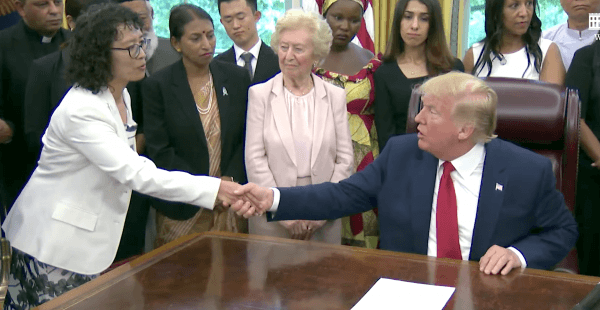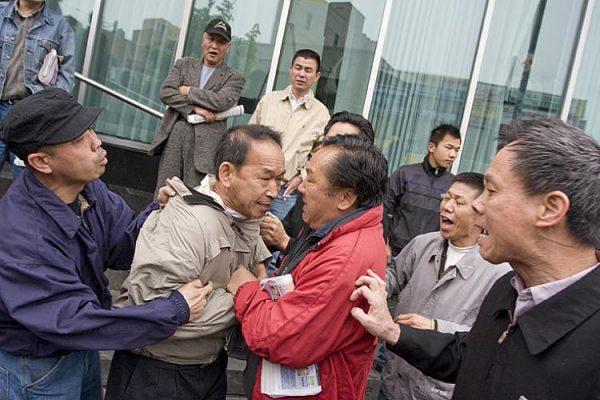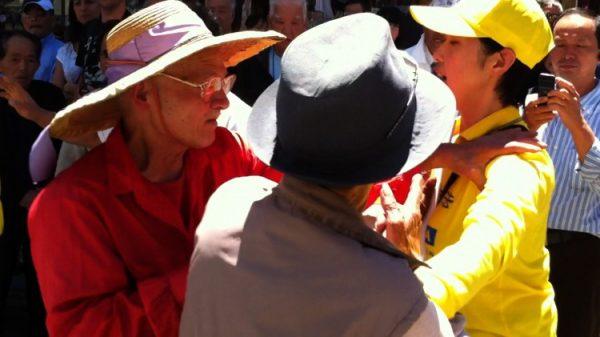Is the U.S. government revealing bias in the kinds of laws it enforces against the Chinese Communist Party’s (CCP) violence and hate crimes on American soil?
But surprisingly, given all the evidence available over the last two decades, according to Washington-based human rights lawyer Terri Marsh, there have been no federal criminal indictments in response to crimes against Falun Gong on U.S. soil.
Marsh, executive director of the Human Rights Law Foundation, told The Epoch Times that she has personally reached out to federal agencies with evidence of crimes against Falun Gong on multiple occasions. Still, the agencies have never taken the next step of an indictment.
In one of the March 16 cases, a New York man running for Congress was targeted with conspiracies to defame his reputation with manufactured evidence or, if that failed, to attack him physically. There are many cases of Falun Gong adherents being attacked physically, including those with alleged links to Chinese officials. Yet they are not included in these recent indictments.
In another case, an artist was targeted with surveillance, and his art—of Xi Jinping made to look like a coronavirus—was destroyed by vandals. The CCP frequently surveils Falun Gong practitioners in America, yet there is no federal prosecution in these latest cases to protect them.
In a third case, former professor Shujun Wang is alleged to have infiltrated or obtained information about Hong Kong, Taiwan, Tibetan, and Uyghur activists, for delivery to China’s secret police, the Ministry of State Security (MSS). Falun Gong is apparently left out of this list, even though some of its adherents are similarly victimized by such infiltration and targeting.
Two days before the DOJ announcement, the Department of State announced visa restrictions on Chinese officials believed responsible for “transnational repression” in China, the United States, and elsewhere. Yet one official, former Consul General Peng Keyu, for whom there is recorded evidence of such repression against Falun Gong in New York, is not included.

In the document, Federal Bureau of Investigation (FBI) Special Agent Garrett Igo noted: “As relevant to this complaint, the MSS uses assets to collect information about, among other things, individuals and groups viewed as potentially adverse to the interests of the PRC, including ethnic Uyghur supporters of the East Turkestan independence movement; Tibetan supporters of the Tibetan independence movement; adherents of the Falun Gong; members of the Chinese democracy movement; and advocates for the Taiwan independence movement, which PRC officials have referred to as ‘the five poisons’ threatening the stability of the PRC and Communist Party rule.”
Yet this is an entirely vague statement that does not clarify that the CCP targets Falun Gong on American soil.
It is still unclear, for example, whether Shujun Wang or any of the other four defendants actually targeted Falun Gong practitioners. Still, there is plenty of evidence of such attacks by other people and their links to the CCP.
Despite such evidence regarding CCP violence, harassment, and stalking against Falun Gong practitioners in the United States, there are no federal indictments, much less successful prosecutions, and convictions. The most recent three federal cases are no different.
Attacks on American Falun Gong Practitioners up to 2006
The Congressional resolution recognized that “the Chinese government has attempted to silence the Falun Gong movement and Chinese pro-democracy groups inside the United States.”The resolution called for a U.S. attorney general investigation into “reports that Chinese consular officials in the U.S. have committed illegal acts while attempting to intimidate or inappropriately influence Falun Gong practitioners or local elected officials.”
The U.S. attorney’s office has taken little to no real action over the years, even as evidence has built for such illegal intimidation.
A group of Falun Gong adherents was then involved in breaking through the Great Firewall in which the CCP restricts access of Chinese citizens to the global internet.
The Forbes article, written in 2006, detailed the case of Dr. Haiyan He, a Harvard researcher who was a Falun Gong activist. “He says he has not only been threatened in person in Boston, but that his parents get regular secret police visits at their home in Chongqing City, China,” according to Forbes. “Three months ago, he says, the secret police described his ‘every move’ in the U.S. to his parents.”
Dayong Li, a Falun Gong activist who owned a satellite service company in New Jersey in 2006, told Forbes that his parents received visits from the secret police in Hunan Province. They “terrorize the elderly couple by saying they know ‘everything’ about their son—including where he walks, his salary and his company details.”
Li told Forbes: “They [Chinese authorities] warn me not to be active. They tell my parents if I am, my life is in danger.”
The 2006 Attack on Peter Yuan Li in Georgia
As Forbes went to press in 2006 about Falun Gong’s work to unblock China’s internet, one of the key figures in this high-tech activism, Peter Yuan Li, “was brutally attacked and beaten in his home in Duluth,” Georgia, according to Forbes.“At 11:15 A.M. on Feb. 8, according to the Fulton County Police Department Incident Report, Asian men stormed the house of the Princeton-educated information technology technician, bound and gagged and beat him, before fleeing with two 16-inch Sony laptop computers, Li’s wallet and yet unknown material from his files.”
Li told Forbes that the first two assailants spoke Korean and brandished a knife and gun. After taping his eyes and binding him, Li claimed that one or two additional men entered his home, one of which demanded in Mandarin to be told where Li’s locker and documents were hidden.
“The intruders ransacked the house and forced open locked file cabinets,” according to Forbes. “After the men left, Li was able to escape into the street, where a neighbor was able to help him and call the police.”
In 2008, the Chinese Consul General in New York Admitted on Tape to Inciting Violence
According to the New York Post, a U.S. State Department official in 2008 confirmed the voice of then-Chinese Consul General in New York Peng Keyu, which was secretly taped, admitting to inciting violent counter-protesters against peaceful Falun Gong practitioners in New York who protested against the CCP.The Post verified a transcript of the call with Peng, shortly after four days of violence against New York Falun Gong members in May 2008 that led to 16 arrests. Peng reportedly said of the CCP protesters, “I have kept a very good relationship with them ... but we encouraged them secretly.”

Peng continued, “After they fought with the Falun Gong, I shook hands with them one by one and thanked them.”
He said: “Yet I must not do things like that right in front of the Falun Gong. I parked my car far from the scene because I must avoid being seen by them.”
In the recording, Peng was asked and confirmed that he had given “guidance” to the violent protesters, saying, “Yes, I have done it. I do it frequently, including this time, when I went out to the scene ... I have even agitated them.”
Violence Against Falun Gong in San Francisco From 1999 to 2012
“The majority of the victims of the CCP’s repression of spiritual beliefs in the U.S. are Falun Gong practitioners,” according to an Epoch Times article in Chinese by Li Zhengkuan about the three new DOJ cases, a translation and sources for which were provided to this author.A Falun Gong spokesperson said at the time of the 2012 violence: “Confrontations like this have happened five times in the past seven months. On two previous occasions we had female practitioners struck. We have had materials torn out of our hands and stolen or ripped up. And we have regularly encountered the foul words and the cursing.”

The spokesperson, Dr. Zhang Xuerong, added: “But it is not just these past seven months. The practitioners of Falun Gong in San Francisco have patiently endured treatment like this for 13 years.”
That would put the start of the violence against Falun Gong in the United States at approximately 1999, the same year that the Chinese regime banned Falun Gong.
Is the Federal Government Biased in Its Enforcement Against Hate Crimes?
Most recently in February, a man with alleged links to a CCP organization attacked Falun Gong information booths in New York City. The 2012 and 2022 incidents include alleged hate crimes against the Falun Gong.Yet there are no federal indictments, much less convictions, and none of the latest federal cases clearly address attacks on Falun Gong in the United States.
A federal bias against protecting Falun Gong practitioners could go deeper than just a lack of enforcement against hate crimes—it points to the to lack of State Department designation of a much more heinous crime, that of genocide committed in China by the CCP.
These issues of failure to enforce and designate—that span the federal government from the State Department through the Department of Justice and the U.S. attorney’s office—raise the question that at the very least, Falun Gong practitioners in the United States might reasonably perceive a lack of, or bias, in federal-level enforcement of laws and designations that should protect all Americans equally, including Falun Gong members, and in the case of a genocide designation, their families back in China.





